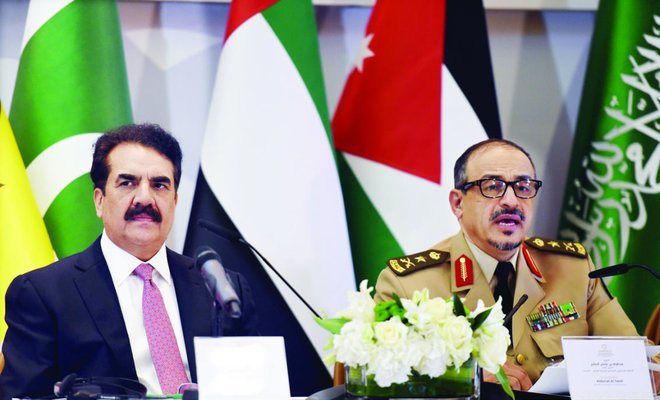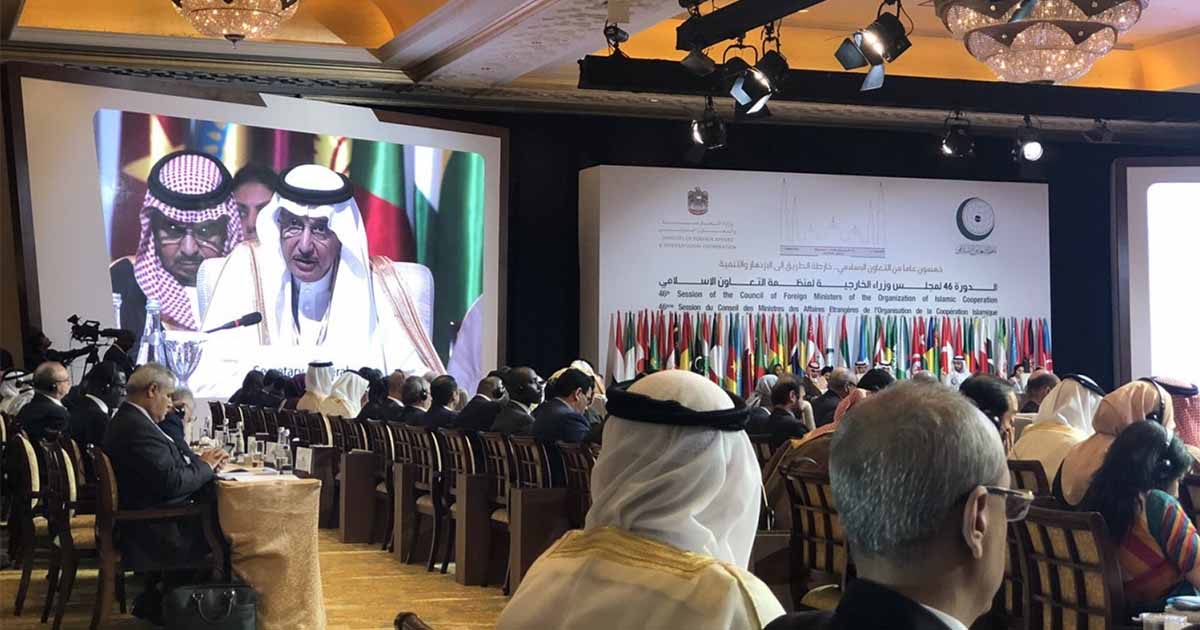GVS Analysis by Najma Minhas|
Iran has finally publicly expressed clear reservations over the appointment of Pakistan’s ex-Army Chief, General Raheel Sharif as the head of Saudi Arabia led Islamic military alliance, known colloquially as the Muslim NATO; Iran say’s it is not ‘satisfied’ with the coalition. It leaves Pakistani government, of Prime Minister Nawaz Sharif, in a tight spot between the rock and a hard place.
“We are concerned about this issue… that it may impact the unity of Islamic countries.”
– Mehdi Honardoost
Few days ago, when Khawaja Asif, the defense minister, revealed on TV, in a current affairs show, that the government had given approval for Gen. Raheel Sharif to take the position, there was a furor across Pakistan; amidst all kinds of opinions in the country dissension was expressed by major political parties over the decision. While none of the political parties has publicly supported the decision, the criticism of Pakistan Tehrik-e-Insaf was most pronounced; it hinted that it will take the issue to parliament. The olive branch given to the media and country was that General Sharif had laid down conditions to accepting and that Iran had been taken into confidence on the matter.
Today, IRNA, Iran’s State-Run News Agency, has quoted Mehdi Honardoost, Iran’s Ambassador to Pakistan as saying, “We are concerned about this issue… that it may impact the unity of Islamic countries.” However, Iran’s ambassador confirmed that Islamabad had contacted Iranian officials to discuss the matter before giving permission to Raheel Sharif to lead the coalition. Moreover, IRNA has made it clear that Iran has reservations.
Read more: Should General Raheel have regrets?
The Saudi Arabian government has sold the coalition as being against terrorism, however, unfortunately, the battle against terrorism and sectarianism are gray areas.
Tehran had at that time informed Islamabad that it would not become part of this military alliance and neither had Iran been extended an offer to join the coalition. Ambassador Honardoost in return proposed that all important Islamic countries should come together to form a “coalition of peace” in order to resolve their issues “rather [than] forming a controversial military alliance”.
Roots of Controversy
Today’s revelation, by IRNA, looks like a calculated strategic move by the Iranian political establishment and it may make it even more harder for Gen. Sharif and government of PM Nawaz Sharif to go ahead with their initiative. Will Gen. Raheel Sharif still go ahead and accept the position is now a million dollar question.
The appointment of General Sharif as head of this military coalition has been very controversial since the idea was first flouted several months ago. All those against the idea are worried about the sectarian dimensions and implications of this decision for a country with 10-15% of Shia population. Pakistan has struggled to maintain a studied neutrality between Iran and its Arab allies and critics of Gen. Sharif’s decision are also concerned on the implications for country’s foreign policy.
Pakistan is one of the leading countries in the Muslim world with a large professional and battle hardened army and nuclear weapons. Country manufactures sophisticated fighter planes in collaboration with China (Joint Strike Fighter, JSF-17) and has advanced missile capability. But Pakistan has generally avoided taking sides in intra-Middle-Eastern conflicts. Egypt and Turkey are other Muslim countries with large military establishments. While Turkey and Egypt both are part of the Saudi led alliance, Egypt – despite being recipient of large Saudi finance after the overthrow of President Morsi – also distanced itself from Saudi involvement in Yemen.
Was Imran asked to tone down his criticism on the issue?
This week, ISPR announced that PTI Chairman, Imran Khan had called upon Army Chief, Gen. Bajwa to congratulate him on his promotion. The fact that Gen. Bajwa was promoted in November 2016, four months ago and that Imran Khan had already felicitated him on phone lead to speculations that Army chief had asked the meeting to request Imran Khan to tone down his criticism of Gen. Sharif’s joining the Saudi Alliance.
Chairman PTI Imran Khan called on COAS. Imran Khan felicitated COAS on his prom and appointment. Various issues came under discussion.
— Maj Gen Asif Ghafoor (@OfficialDGISPR) March 31, 2017
Will PTI still raise the issue in parliament as it had earlier suggested is not known; however in a public rally in Talagang, district Chakwal, on Sunday, Imran Khan asserted that Pakistan’s role in Middle East should be strictly that of a meditator and not an ally of any side. PTI sources also looked at ISPR tweet with deep suspicion, pointing out that ISPR had not tweeted when Gen. Bajwa met ex-President, Asif Ali Zardari in February.
https://www.youtube.com/watch?v=Tg9nkz0Xx1w
Concerns of Critics: Terrorism or Sectarian Conflict?
This group, mostly consisting of ex-miliary officers, argues that Pakistan must not remain disengaged from the developments in Middle East which is an important region in its backyard.
The Saudi Arabian government has sold the coalition as being against terrorism, however, unfortunately across the Middle East, the battle against terrorism and sectarianism has murky borders. While the Saudi Arabia has stated that the coalition will involve operations against terrorism in Iraq, Syria, Libya, Egypt, and Afghanistan; it did not help its cause, that the coalition was announced when it was in the middle of a messy and intractable military situation inside Yemen.
Nations in the Islamic coalition will include Egypt, Turkey, Malaysia, Muslim countries in Africa and, in the Gulf, Qatar and the United Arab Emirates but neither Iran nor Iraq – both of which have Shiite majorities. This is what gives the coalition its decidedly sectarian look. Saudi’s could rectify this immediately by asking Iraq to join and at least hold out a supposed olive branch to Iran – knowing fully well that they are not likely to accept.
Read more: Nasser Janjua thinks Raheel Sharif will bring unity among ‘Muslim world’
Pakistan has been under pressure to join the coalition since it was formed in December 2015. Initially, the Saudi Arabian government named it as a member of the coalition, without even getting Pakistan’s acquiescence on the matter.
Given the resistance the coalition has faced from the opposition political parties and the media, the government – that is keen to join – has kept a deliberate policy of ambiguity in public over the objectives of this coalition and its ambit.
Pressures upon Pakistan & Nawaz Sharif?
At a time when new institutions are being shaped, and when Trump administration has already signaled a shift in its approach towards Iran and Saudi-Arabia it is vital for Pakistan to stay engaged with key players in the region – and deny its enemies to occupy space
Pakistan is under a lot of pressure to improve tense relations with Saudi Arabia and other GCC countries, which saw dip after the country did not send soldiers for the Yemen war when requested in April 2015. It has over 6 million strong diaspora spread across GCC countries, and close to 70 percent of its remittances, around $10 billion come from the Middle East. The Saudi’s have also helped the country when it was in dire financial conditions. From time to time, Kingdom helped Pakistani governments by giving petrol on deferred payment terms (when oil was at its peak). Saudi Arabia provided $1.5 billion in cash for ‘development projects’ to the Nawaz government in 2013, immediately after the elections. Nawaz Sharif has spent his years of exile in Saudi Arabia when King Abdullah brokered a deal for him with Gen. Musharraf allowing him to get rid of corruption cases against him, and live in the comforts of Saroor palace in Jeddah.
Strategic Arguments for Pakistani involvement
An elaborate exercise done by National Defense University (NDU) in 2015-16 on the instructions of Prime Minister had concluded that Pakistan must stay away from the ancient Persian-Arab rivalry. NDU Report was conveyed to PM secretariat via Foreign Office.
While personal compulsions of Nawaz Sharif, desire to reduce tensions with GCC countries building since Pakistan’s ill designed parliamentary debate on Yemen issue in 2015 and financial leverage of Saudis remains in popular discussion; there are others who advance a “strategic argument”. This group, mostly consisting of ex-miliary officers, argue that Pakistan must not remain disengaged from the developments in Middle East which is an important region in its backyard. At a time when new institutions are being shaped, and when Trump administration has already signaled a shift in its approach towards Iran and Saudi-Arabia it is vital for Pakistan to stay engaged with key players in the region.
However others reveal that an elaborate exercise done by National Defense University (NDU) in 2015-16 on the instructions of Prime Minister had concluded that Pakistan must stay away from the ancient Persian-Arab rivalry. NDU Report was conveyed to PM secretariat via Foreign Office. But the so called “Strategic Argument group” says that no one in Pakistan’s defense establishment favors being an ally of one side against the other in Middle East. However they view Saudi initiative as more of a “regional political optics” rather than any physical kinetic activity on ground. Saudi Arabia, to them, is only showing its clout to the US and building pressure upon Iran to weaken its rapprochement with the west. Iran’s economic integration with the west threatens Saudi interests and weakens its leverage over the western allies – mainly the US.
Even critics of Iran agree that in view of Pakistan’s interest in regional integration, in the form of CPEC, supported by Iran and Iran’s support for a dialogue with Afghan Taliban in Moscow Talks (next round on April 14) Pakistan must not do anything to alienate Iranian leadership. They also point to Iran’s considerable influence in country civil society and media. On top of all these factors, Iran’s high profile participation in recent ECO Summit in Islamabad has widened good will towards Iran.
But the so called “Strategic Argument group” says that no one in Pakistan’s defense establishment favors being an ally of one side against the other in Middle East. However they view Saudi initiative as more of a “regional political optics” rather than any physical kinetic activity on ground.
General Raheel Sharif, who is purportedly being paid 1 million dollar salary for the position, is said to have laid down certain terms for accepting it. However, these have never been made public and it is not known what these exactly consist off. Three, that are being discussed in the media by defense analysts include; that he has asked the Saudi’s that Iran should be included in the coalition, second that he will not work under anyone else’s leadership and that he will play the role of mediator between Muslim countries and try to bring unity.
Read more: Is PTI right in taking a position against Gen. Raheel Sharif going to Saudi Arabia?
Even critics of Iran agree that in view of Pakistan’s interest in regional integration, in the form of CPEC, supported by Iran and Iran’s support for a dialogue with Afghan Taliban in Moscow Talks (next round on April 14) Pakistan must not do anything to alienate Iranian leadership.
His third condition of bringing unity is a laudatory one which presumably all Muslims in all wakes of life should have. The second one, Saudi’s shouldn’t have much problem acceding with – he will be answerable directly to Mohammed bin Salman – Saudi Arabia’s young 31 year old crown prince and Defense Minister; sometimes referred to as the most powerful man in the kingdom.
But today’s revelation, by IRNA, looks like a calculated strategic move by the Iranian political establishment and it may make it even more harder for Gen. Sharif and government of PM Nawaz Sharif to go ahead with their initiative. Will Gen. Raheel Sharif still go ahead and accept the position is now a million dollar question.
Najma Minhas is Managing Editor, Global Village Space. Earlier she worked with National Economic Research Associates (NERA), in London and New York, Investment bank, Lehman Brothers in London and Standard Chartered Bank in Pakistan. She studied International Relations from Columbia University, New York and Economics from London School of Economics & Political Science.












